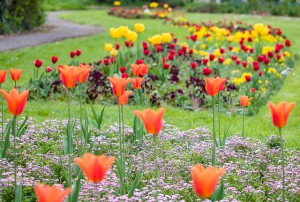Plants sold at home and garden stores may have high toxic chemical levels
Concerned by the declining numbers of honeybees, many community members have attempted to provide urban foraging grounds for pollinators through bee-friendly garden plantings. Unfortunately, according to a recent report published by Friends of the Earth, these actions of goodwill toward bees may have unintended consequences. Researchers found that 54 percent of plants purchased from commercial nurseries had residues of neonicotinoid, a systemic pesticide that can be taken up by seeds, roots, or leaves and spreads through the entire plant. These pesticides have been blamed for multiple bee die-offs, and implicated in contributing to colony collapse disorder. This overuse of neonicotinoids in commercial operations has made it difficult for community members to maintain gardens without contributing to the harmful spread of pesticides, because the systemic action of neonicotinoids results in pesticide residue remaining toxic within the plant for longer than other pesticides. The study recommends that to protect bees home gardeners should avoid the use of neonicotinoid pesticides, and purchase untreated plants and seeds.



